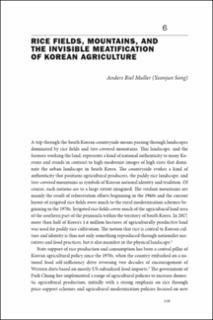| dc.contributor.author | Müller, Anders Riel | |
| dc.coverage.spatial | South Korea | en_US |
| dc.date.accessioned | 2023-08-23T11:09:52Z | |
| dc.date.available | 2023-08-23T11:09:52Z | |
| dc.date.created | 2023-04-13T09:17:57Z | |
| dc.date.issued | 2023 | |
| dc.identifier.citation | Riel Muller, A (2023). "6. Rice Fields, Mountains, and the Invisible Meatification of Korean Agriculture". In: D. Fedman, E. J. Kim and A. L. Park (eds.) Forces of Nature: New Perspectives on Korean Environments, pp. 109-121, Ithaca, NY: Cornell University Press. | en_US |
| dc.identifier.isbn | 978-1-5017-6879-8 | |
| dc.identifier.uri | https://hdl.handle.net/11250/3085421 | |
| dc.description.abstract | A trip through the South Korean countryside means passing through landscapes dominated by rice fields and tree-covered mountains. This landscape, and the farmers working the land, represents a kind of national authenticity to many Ko reans and stands in contrast to high modernist images of high rises that domi nate the urban landscape in South Korea. The countryside evokes a kind of authenticity that positions agricultural producers, the paddy rice landscape, and tree-covered mountains as symbols of Korean national identity and tradition. Of course, such notions are to a large extent imagined. The verdant mountains are mainly the result of reforestation efforts beginning in the 1960s and the current layout of irrigated rice fields owes much to the rural modernization schemes be ginning in the 1970s. Irrigated rice fields cover much of the agricultural land area of the southern part of the peninsula within the territory of South Korea. In 2017, more than half of Korea’s 1.6 million hectares of agriculturally productive land was used for paddy rice cultivation. The notion that rice is central to Korean cul ture and identity is thus not only something reproduced through nationalist nar ratives and food practices, but it also manifest in the physical landscape. | en_US |
| dc.language.iso | eng | en_US |
| dc.publisher | Cornell University Press | en_US |
| dc.relation.ispartof | Forces of Nature: New Perspectives on Korean Environments | |
| dc.relation.uri | https://hdl.handle.net/11250/3065930 | |
| dc.rights | Attribution-NonCommercial-NoDerivatives 4.0 Internasjonal | * |
| dc.rights.uri | http://creativecommons.org/licenses/by-nc-nd/4.0/deed.no | * |
| dc.subject | Sør-Korea | en_US |
| dc.subject | jordbruk | en_US |
| dc.subject | landbruk | en_US |
| dc.subject | risdyrking | en_US |
| dc.title | Rice Fields, Mountains and the Invisible Meatification of Korean Agriculture | en_US |
| dc.type | Chapter | en_US |
| dc.description.version | publishedVersion | en_US |
| dc.subject.nsi | VDP::Samfunnsvitenskap: 200 | en_US |
| dc.source.pagenumber | 109-121 | en_US |
| dc.identifier.doi | 10.1515/9781501768811-014 | |
| dc.identifier.cristin | 2140468 | |
| cristin.ispublished | true | |
| cristin.fulltext | original | |
| cristin.fulltext | original | |
| cristin.qualitycode | 2 | |

